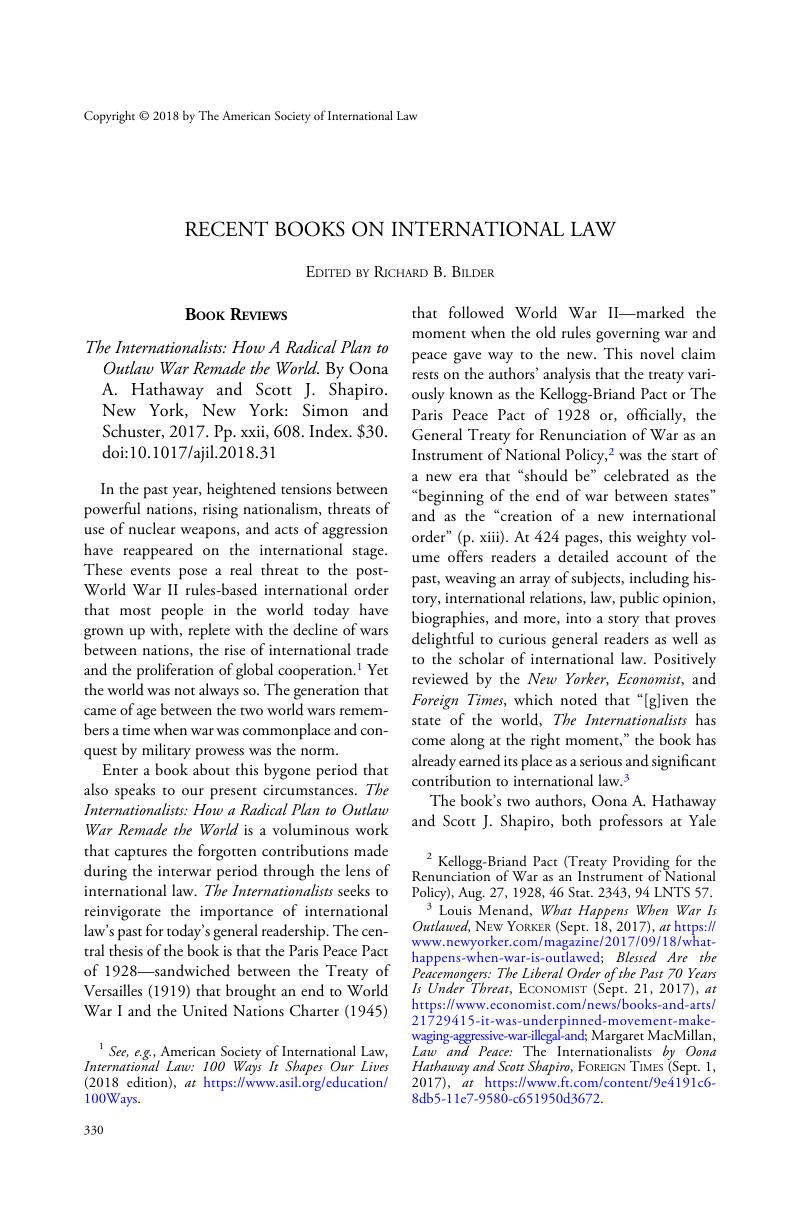Published online by Cambridge University Press: 30 April 2018

1 See, e.g., American Society of International Law, International Law: 100 Ways It Shapes Our Lives (2018 edition)Google Scholar, at https://www.asil.org/education/100Ways.
2 Kellogg-Briand Pact (Treaty Providing for the Renunciation of War as an Instrument of National Policy), Aug. 27, 1928, 46 Stat. 2343, 94 LNTS 57.
3 Louis Menand, What Happens When War Is Outlawed, New Yorker (Sept. 18, 2017), at https://www.newyorker.com/magazine/2017/09/18/what-happens-when-war-is-outlawed; Blessed Are the Peacemongers: The Liberal Order of the Past 70 Years Is Under Threat, Economist (Sept. 21, 2017), at https://www.economist.com/news/books-and-arts/21729415-it-was-underpinned-movement-make-waging-aggressive-war-illegal-and; Margaret MacMillan, Law and Peace: The Internationalists by Oona Hathaway and Scott Shapiro, Foreign Times (Sept. 1, 2017), at https://www.ft.com/content/9e4191c6-8db5-11e7-9580-c651950d3672.
4 Oona A. Hathaway, Yale Law School Professional Biography, at https://law.yale.edu/oona-hathaway. See Brian Lieter, Top Ten Law Faculty (by Area) in Scholarly Impact, 2009–2013, Brian Leiter's Law School Rankings, at http://www.leiterrankings.com/faculty/2014_scholarlyimpact.shtml.
5 Scott J. Shapiro, Yale Law School Professional Biography, at https://law.yale.edu/scott-j-shapiro.
6 Menand, supra note 3.
7 Blessed Are the Peacemongers, supra note 3.
8 U.S. Dep't of State, Office of the Historian, The Kellogg-Briand Act, 1928, at https://history.state.gov/milestones/1921-1936/kellogg.
9 Brown, Stewart, Japan Stuns the World, Withdraws from League, UPI Archives (Feb. 24, 1933)Google Scholar, at https://www.upi.com/Archives/1933/02/24/Japan-stuns-world-withdraws-from-league/2231840119817.
10 Correlates of War Project, Data Sets, at http://www.correlatesofwar.org/data-sets.
11 Steven Pinker, The Better Angels of Our Nature: Why Violence Has Declined (2011). See also Joshua Goldstein, Winning the War on War: The Decline of Armed Conflict Worldwide (2011).
12 In footnote 8 of Chapter 13, the authors cite Tir, Jaroslav, Schafer, Philip, Diehl, Paul & Goertz, Gary, Territorial Changes, 1816–1996: Procedures and Data, 16 Conflict Mgmt. & Peace Sci. 89 (1998)CrossRefGoogle Scholar.
13 Gary Goertz, Paul F. Diehl & Alexandru Balas, The Puzzle of Peace: The Evolution of Peace in the International System (2016). Hathaway and Shapiro cite this book in footnote 9 of Chapter 13 noting that this and other work “arrived at conclusions consistent with ours.”
14 Id. at 108.
15 Id. at 109.
16 Id. at 111.
17 Id. at 115 (“After World War II, conquest becomes extremely rare.”).
18 Max Boot, When the Governments of the World Agreed to Banish War, N.Y. Times (Sept. 21, 2017), at https://www.nytimes.com/2017/09/21/books/review/the-internationalists-oona-hathaway-scott-shapiro.html (finding that “their book shows that there was a more gradual trend over the centuries to impose humanitarian restrictions on warfare”).
19 Walt, Stephen M., There's Still No Reason to Think the Kellogg-Briand Pact Accomplished Anything, For. Pol'y (Sept. 29, 2017)Google Scholar, at http://foreignpolicy.com/2017/09/29/theres-still-no-reason-to-think-the-kellogg-briand-pact-accomplished-anything.
20 See, e.g., Makau Mutua, Human Rights Standards: Hegemony, Law and Politics (2016); Adrien K. Wing, Critical Race Feminism, in Theories of Race and Ethnicity: Contemporary Debates and Perspectives (Karim Murji & John Solomos eds., 2015); Jenny S. Martinez, The Slave Trade and the Origins of International Human Rights Law (2012); Henry Richardson III, The Origins of African American Interest in International Law (2008); Alvarez, José E., Interliberal Law: Comment, in Hathaway, Oona A. & Koh, Harold H., Foundations of International Law and Politics 103, 108 (2004)Google Scholar (“Liberal theorists have to work hard to convince people that they are really interested in what goes on within all types of regimes and not just within the regulatory bureaucracies of the transatlantic.”); Antony Anghie, Imperialism, Sovereignty and the Making of International Law (2005); Balakrishnan Rajagopal, International Law from Below: Development, Social Movements and Third World Resistance (2003); Derek Bell, Faces at the Bottom of the Well: The Permanence of Racism (1992).
21 Author Oona Hathway offers an engaged exploration of these topics in Treaties’ End: The Past, Present and Future of International Lawmaking in the United States, 117 Yale L.J. 1236 (2008)
22 E.g., on pp. 172–174, the authors describe Emperor Haile Sallese charging Italy with aggression for its military invasion in 1934 and the League of Nation's reluctance to apply the policy of nonrecognition of territory acquired by conquest against Italy, describing the U.S. response as “lackluster” (p. 173) but saying nothing about the underlying racial animus behind these responses.
23 E.g., p. 317 (“After a brief slowdown in the 1850s and 1860s, that number shot up to between 5.9 million and 8.8 million square kilometers a decade for the rest of the century—a good deal of it caused by the European scramble for Africa.”); p. 342 (“During the scramble for Africa, for instance, local leaders frequently agreed to the creation of protectorates as a defensive move to prevent more aggressive assertions of authority.”).
24 For a comprehensive history and analysis see James Anaya, Indigenous Peoples in International Law (2d ed. 2004).